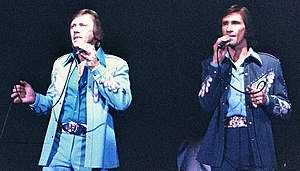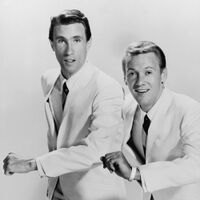The Righteous Brothers
Relevance
In Autobiography, Morrissey says of them:
"Record Song Book is an expensive magazine that prints the lyrics of famous or bubbling songs of the month, and I practice with invented melodies on the songs that I haven’t heard. It is only the singing voice, I decide, that tells us how things became how they are, and You’ve lost that lovin’ feelin’ by the Righteous Brothers had led me to the light. In this duet between Bill and Bobby, the language of despair becomes beautiful, and the final forty-five seconds hit such call-and-respond excitement that I am now in danger of feeling too much. Bobby’s rooftop falsetto is the fire in the belly, whilst Bill’s deep-chested leveling is the full invasion. Suddenly everything else in life is in question."
Further:
"But again and again it is the sight of the Righteous Brothers singing You’ve lost that lovin’ feelin’ (to each other?), gazing into their own separate distances. I cherish each glimpse that television allows – so unrepeatable, and God forbid that anyone should talk too loudly or meddle with the sound. Yes, there he goes again – Cherub Bobby swooping up into a female scream, and visual art unravels before me."
See also:
Bobby Hatfield
Discogs Information
Profile
William Medley: born 19 September 1940, in Los Angeles, USA. Bobby Hatfield: born 10 August 1940, in Beaver Dam, Wisconsin, USA / died: 5 November 2003, in Kalamazoo, Michigan, USA.
The Righteous Brothers were born in 1963, and were the two remaining members of the vocal group, The Paramours.
They're probably best known for two tracks "Unchained Melody" and "You've Lost That Lovin' Feelin' ". The latter being written and produced by legendary producer Phil Spector from 1964, which many critics deem to be the pinnacle of Spectors' producing career. In order for Lovin' Feelin's success, many believe it can be attributed to the fact the playing time was listed on the original promo's sent to radio stations as 3:05 --because Spector refused to shorten the track-- which was lower that it's actual playing time of nearer 4 minutes at 3:45. This is because at that time many stations would program shows to fit-in with ad-breaks so wouldn't play anything longer than around 3 minutes long. Also, British pop artist Cilla Black released a version in Christmas 1964, before the original version was released in the UK, which furthermore attracted media attention. All this happening despite the US being in the middle of Beatlemania and the British Invasion.
In 1999, the performing-rights organization Broadcast Music, Inc. (BMI) announced that it was the most-played song of the 20th century. Additionally, the song was chosen as one of the Songs Of The Century by Recording Industry Association of America (RIAA).
Inducted into Rock And Roll Hall of Fame in 2003 (Performer).
External Links
- https://www.discogs.com/artist/254127-The-Righteous-Brothers
- http://www.righteousbrothers.com
- https://www.facebook.com/righteousbrothersofficial/
- http://www.righteousbrothersdiscography.com
- https://en.wikipedia.org/wiki/The_Righteous_Brothers
Wikipedia Information
 |
The Righteous Brothers are an American musical duo originally formed by Bill Medley and Bobby Hatfield but now comprising Medley and Bucky Heard. Medley formed the group with Hatfield in 1963. They had first performed together in 1962 in the Los Angeles area as part of a five-member group called the Paramours, and adopted the name The Righteous Brothers when they became a duo. Their most active recording period was in the 1960s and '70s, and, after several years inactive as a duo, Hatfield and Medley reunited in 1981 and continued to perform until Hatfield's death in 2003. The term "blue-eyed soul" is thought to have first been coined by Philadelphia radio DJ Georgie Woods in 1964 when describing the duo's music.Hatfield and Medley had contrasting vocal ranges, which helped them create a distinctive sound as a duet. They each had the vocal talent to perform as soloists. Medley sang the low parts with his bass-baritone voice, with Hatfield taking the higher-register vocals with his tenor. His voice reached the register of a countertenor.Following a year and a half of Top 40 non-entries on Billboard's Hot 100, the duo hit big with the late-1964 release of what would become their signature record, "You've Lost That Lovin' Feelin'" – a transatlantic number one produced by Phil Spector, often considered one of his finest works and a landmark recording in popular music. Other notable hits include three US 1965 Top Tens – "Just Once in My Life" and covers of "Unchained Melody" (also a huge hit in 1990 after being featured in the film Ghost) and "Ebb Tide" – and the massive US 1966 number one "(You're My) Soul and Inspiration", plus the 1974 comeback hit "Rock and Roll Heaven". Both Hatfield and Medley also had for a time their own solo careers. In 2016, Medley re-formed The Righteous Brothers with Bucky Heard and they continue to perform as a duo.The Righteous Brothers were inducted into the Rock and Roll Hall of Fame in 2003 and into the Vocal Group Hall of Fame in 2005. Rolling Stone ranked them no. 16 on its list of the 20 Greatest Duos of All Time.
